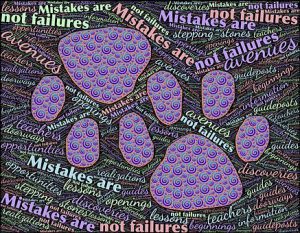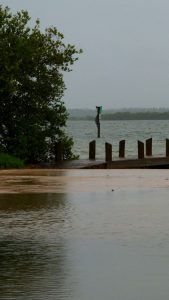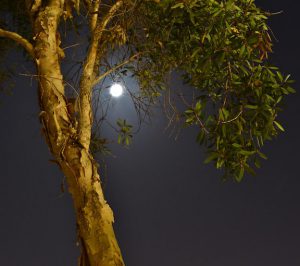All parts of this story are consolidated on one page here.
The wide stone hallway leading into the hillside looked warm and inviting. The torches lining the walls burned steadily, without noticeable smoke or flickering. Ina had already taken a step toward it before she realized what she was doing. The other girls moved forward with her.

(Creative Commons image via flickr)
“Do come in, dear girls,” urged the black-cloaked woman, who was now standing just outside the doorway. “I am delighted to welcome you! My name is Petra, and I am the guardian of this sacred threshold.”
The red-haired girl standing to Ina’s right, who was looking more confident than a minute ago, took another step toward the door in response. “Uh, hello ma’am. I’m Firefly.”
“You are indeed!” Petra declared, looking appreciatively at the swarm of blinking fireflies hovering around the girl. “Your tiny companions have done well, leading you safely through the forest. They have completed their task and are now free to depart with our gratitude.”
At her words, the fireflies immediately began to disperse and soon flew out of sight into the forest’s depths. The red-haired girl entered the doorway as Petra approached the tall girl on Ina’s left.
“Your name will be Violet, my dear,” Petra announced even more cheerfully, extending her arms as if to embrace the glowing purplish moths that surrounded the girl. “To be sure, your little friends are exactly the color of a lovely patch of violets in a meadow on a sunny afternoon. Many thanks to you all, dear moths, and you’re now at liberty to leave.”
The moths began lifting away into the darkness, just as the fireflies had done. Violet, now without escort, took a few steps into the stone hallway and then stopped to wait next to Firefly.
“And you’re Phoenix, of course. Your companion is free to leave with much appreciation for work well done,” Petra informed the dark-haired girl standing next to the fiery bird. Just after Petra spoke, there was a crackling noise like a burning log suddenly falling to the ground in a campfire. Sparks flew up from the bird, and its outline perched on the granite boulder became indistinct, fading into the night air. Petra calmly picked up the flickering orange egg that remained atop the boulder and slipped it into a pocket of her cloak.
“That’s just her way, disappearing like that,” Petra said reassuringly. “No harm done. She’ll hatch again when the time is right.”
The dark-eyed girl in the moss-covered cloak took a deep breath and blinked, but did not speak, as Petra turned to her.
“You’re a dryad, how delightful! Or perhaps a naiad, with this lovely river moss. I shall call you Daphne. We can release the moss now, with our thanks; you won’t have any need for it indoors, and even river moss has a life to which it longs to return, as simple as it is.”
The glowing patches of moss separated from Daphne’s cloak and flowed smoothly to the ground, oozing away in the general direction of the river. Daphne threw back the hood of her cloak, which was now a nondescript fabric of a muddy color. Thick vine-like braids were pinned neatly on top of her head.
Petra then turned to Ina.
“My dear, you have a rare talent. The lightning serves you like a faithful hound. I’ll call you…”
“Ina. My name is Ina.” She knew the interruption sounded surly, but letting herself be renamed without any say in the matter—well, that just wasn’t happening, not tonight.
As if reflecting her sentiments, the hovering ball of witch-fire that Ina had plucked from a lightning flash suddenly burst. It crackled through the air in a bright, arcing bolt, complete with thunderclap, and then dissipated into the night sky. Unlike the other magical guides, it hadn’t waited to be granted leave to depart before it vanished.
Petra looked somewhat taken aback but quickly regained her composure. Turning from Ina toward the girls in the doorway, she clapped her hands briskly. “Come now, my little ducklings, let’s go indoors. You must all be tired after such a long day. A light supper for you, and then it’s off to bed! Tomorrow will be very busy.”
Click here to continue to Part 6.










